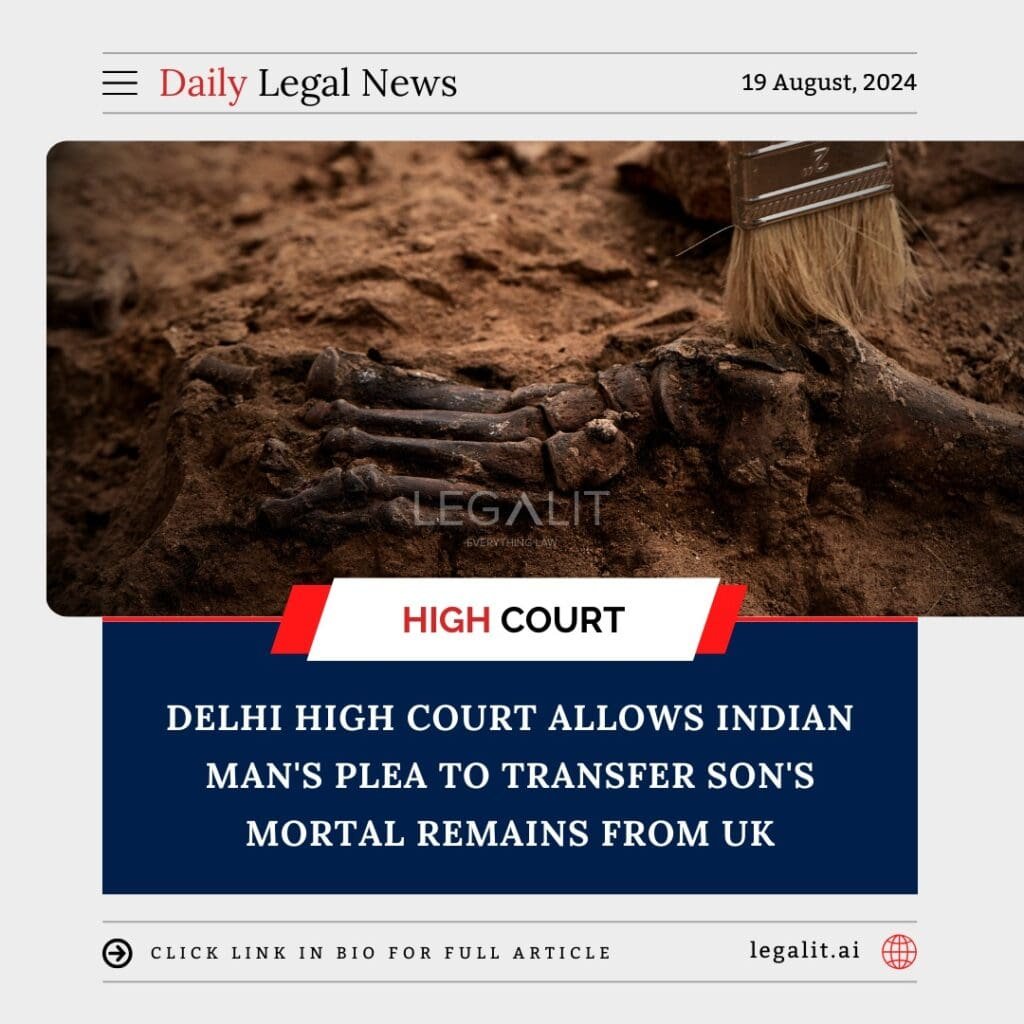
In a compassionate and significant ruling, the Delhi High Court has granted permission to an Indian man to bring back the mortal remains of his son from the United Kingdom. The case highlights the emotional and legal complexities involved in repatriating the remains of deceased individuals from abroad, particularly in cases where legal, diplomatic, or procedural challenges arise.
Background of the Case
The case involves an Indian man who sought the Delhi High Court’s intervention to facilitate the transfer of his son’s mortal remains from the UK to India. The son had passed away in the UK, and the family desired to perform the last rites in India, as per their customs and religious beliefs. However, the repatriation process had faced delays or obstacles, prompting the father to seek legal recourse.
The reasons for the delay in repatriation could include bureaucratic hurdles, legal formalities required by UK authorities, or issues related to transportation and documentation. Such situations can be deeply distressing for grieving families who wish to bring their loved ones home for their final rites.
High Court’s Ruling
- Granting of Permission: The Delhi High Court ruled in favor of the father’s plea, allowing the transfer of his son’s mortal remains from the UK to India. The Court recognized the urgency and emotional significance of the request, prioritizing the family’s right to perform the last rites in accordance with their customs.
- Direction to Authorities: The Court may have directed Indian authorities, including the Ministry of External Affairs (MEA), to coordinate with their counterparts in the UK to expedite the repatriation process. This could involve ensuring that all necessary legal and logistical requirements are met swiftly.
- Humanitarian Consideration: The ruling underscores the Court’s sensitivity to humanitarian issues, particularly in cases involving the loss of a loved one. The Court’s decision reflects the importance of respecting the cultural and religious practices surrounding death and the final rites.
Implications of the Ruling
The Delhi High Court’s decision has several important implications:
- Precedent for Repatriation Cases: The ruling sets a precedent for how similar cases might be handled in the future, particularly regarding the repatriation of mortal remains. It reinforces the idea that such matters should be treated with urgency and compassion by the legal system.
- Role of Diplomatic Channels: The case highlights the crucial role of diplomatic channels and international cooperation in facilitating the repatriation of mortal remains. The Court’s involvement may prompt Indian authorities to streamline processes and work closely with foreign counterparts in such cases.
- Support for Grieving Families: The decision provides a measure of relief for the grieving family, ensuring that they can fulfill their cultural and religious obligations. It also emphasizes the legal system’s role in supporting families during times of distress.
- Government Responsibility: The ruling may encourage the Indian government to review and potentially improve the procedures for assisting citizens who face difficulties in repatriating the remains of loved ones from abroad.
Moving Forward
Following the Court’s ruling, several steps are likely to be taken:
- Coordination Between Governments: Indian authorities, particularly the MEA, will need to work closely with UK officials to facilitate the smooth and swift transfer of the mortal remains, ensuring that all legal and procedural requirements are fulfilled.
- Legal and Diplomatic Support: The family may receive additional legal and diplomatic support to navigate any remaining challenges in the repatriation process, ensuring that the son’s remains are returned to India without further delay.
- Review of Policies: The case could prompt a review of existing policies and procedures related to the repatriation of mortal remains, potentially leading to more efficient and compassionate handling of such cases in the future.
- Public Awareness: The ruling may raise awareness about the challenges families face in repatriating the remains of loved ones and the importance of legal and diplomatic interventions in resolving such issues.
Conclusion
The Delhi High Court’s decision to allow the transfer of an Indian man’s son’s mortal remains from the UK to India is a compassionate and timely ruling that acknowledges the emotional and cultural significance of repatriating deceased loved ones. By facilitating this process, the Court has provided crucial support to a grieving family and set a precedent for handling similar cases with urgency and empathy. As the case progresses, it underscores the importance of cooperation between legal, governmental, and diplomatic entities in addressing the challenges faced by families during such difficult times.